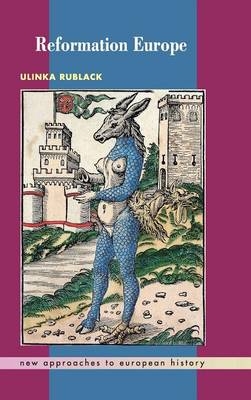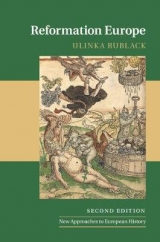
Reformation Europe
Seiten
2005
Cambridge University Press (Verlag)
978-0-521-80284-0 (ISBN)
Cambridge University Press (Verlag)
978-0-521-80284-0 (ISBN)
- Titel erscheint in neuer Auflage
- Artikel merken
Zu diesem Artikel existiert eine Nachauflage
How could the Protestant Reformation take off from a tiny town in the middle of Saxony? Martin Luther founded a religion which still determines many people's lives in intimate ways, and so did Jean Calvin one generation later. This book provides a unique discussion of Protestant everyday culture across Europe.
Here are two of the most tantalising questions in Western history: how could the Protestant Reformation take off from a tiny town in the middle of Saxony, which contemporaries regarded as a mud hole? How could a man of humble origins who was deeply scared by the devil become a charismatic leader and convince others that the pope was the living Antichrist? Martin Luther founded a religion which up to this day determines many people's lives in intimate ways, and so did Jean Calvin in Geneva one generation later. This is the first book which uses the approaches of the new cultural history to describe how Reformation Europe came about and what it meant. It also challenges the idea that Protestantism was a more rational religion of the Word, providing a unique and lively discussion of Protestant everyday culture across Europe.
Here are two of the most tantalising questions in Western history: how could the Protestant Reformation take off from a tiny town in the middle of Saxony, which contemporaries regarded as a mud hole? How could a man of humble origins who was deeply scared by the devil become a charismatic leader and convince others that the pope was the living Antichrist? Martin Luther founded a religion which up to this day determines many people's lives in intimate ways, and so did Jean Calvin in Geneva one generation later. This is the first book which uses the approaches of the new cultural history to describe how Reformation Europe came about and what it meant. It also challenges the idea that Protestantism was a more rational religion of the Word, providing a unique and lively discussion of Protestant everyday culture across Europe.
Ulinka Rublack is a Lecturer in History at Cambridge University and a Fellow of St John's College. Her previous publications include The Crimes of Women in Early Modern Germany (1999).
Prologue: prophecy; 1. Martin Luther's truth; 2. The age of heterodoxy; 3. Calvinism; 4. Truths of everyday life; Epilogue: towards a cultural history of the Reformation.
| Erscheint lt. Verlag | 17.2.2005 |
|---|---|
| Reihe/Serie | New Approaches to European History |
| Zusatzinfo | 1 Maps; 24 Halftones, unspecified |
| Verlagsort | Cambridge |
| Sprache | englisch |
| Maße | 157 x 235 mm |
| Gewicht | 492 g |
| Themenwelt | Geschichte ► Allgemeine Geschichte ► Neuzeit (bis 1918) |
| Geisteswissenschaften ► Geschichte ► Regional- / Ländergeschichte | |
| ISBN-10 | 0-521-80284-9 / 0521802849 |
| ISBN-13 | 978-0-521-80284-0 / 9780521802840 |
| Zustand | Neuware |
| Haben Sie eine Frage zum Produkt? |
Mehr entdecken
aus dem Bereich
aus dem Bereich
Europa 1848/49 und der Kampf für eine neue Welt
Buch | Hardcover (2023)
DVA (Verlag)
48,00 €
Giordano Bruno - ein ketzerisches Leben
Buch | Hardcover (2024)
C.H.Beck (Verlag)
29,90 €



